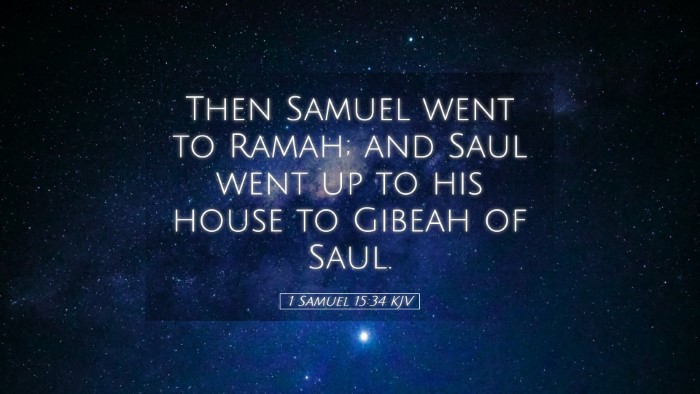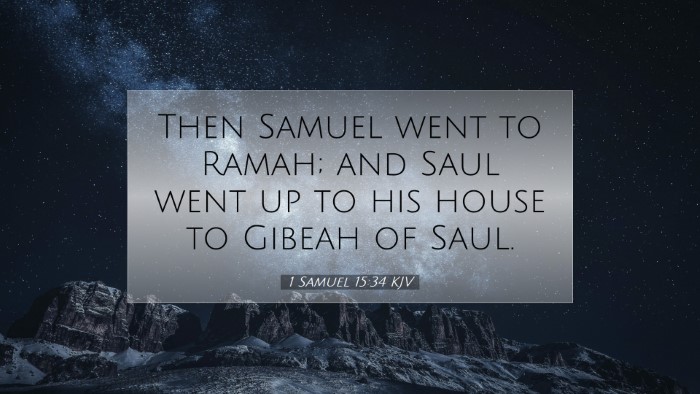Commentary on 1 Samuel 15:34
Verse Text: "Then Samuel went to Ramah; and Saul went up to his house to Gibeah of Saul."
Contextual Understanding
This verse concludes the dramatic account of King Saul’s rejection by God. Following Saul’s disobedience in failing to fully execute God’s command regarding the Amalekites,
Samuel delivers God’s message of judgment. The journey of both Samuel and Saul symbolizes the broken relationship between God and Saul.
While Saul retreats to his house in Gibeah, Samuel returns to Ramah, highlighting the rift.
Insights from Public Domain Commentaries
Matthew Henry's Commentary
Matthew Henry emphasizes the gravity of disobedience against divine command. He notes that Saul’s actions had dire consequences, not just for himself,
but for the entire nation of Israel. His commentary reflects on the significance of Samuel's sorrow over Saul and how it portrays the prophet's deep concern for God’s honor.
Henry highlights that Saul's retreat to Gibeah, a place of his previous successes, illustrates the folly of trusting in past victories instead of continuing obedience to God.
He underscores the theme of divine judgment which serves as a warning to the faithful about the seriousness of maintaining a proper relationship with God.
Albert Barnes' Notes on the Bible
Albert Barnes reflects on the post-rejection circumstances of Saul and Samuel. He notes how Samuel's return to Ramah indicates a withdrawal from Saul’s rule, implying
that Saul no longer had the Lord's support. Barnes comments on Saul's physical journey up to Gibeah as symbolic of his internal decline.
Furthermore, Barnes addresses God's plan for leadership in Israel. He elucidates that Saul’s departure from divine instruction leads to his imminent replacement,
paving the way for David. This reflection prompts a discussion on divine justice and the prospect of new beginnings despite failures.
Adam Clarke's Commentary
Adam Clarke offers a poignant analysis of the emotional undertones in the verse. He emphasizes Samuel's deep sorrow as a reflection of God’s grief
over Saul’s disobedience. Clarke posits that this reveals the compassionate nature of God, who desires obedience and relationship over ritualistic offerings.
Clarke also discusses Saul's behavior post-rejection. His return to Gibeah is portrayed as an attempt to reclaim his former status amidst the impending loss of kingship.
The tension between divine judgment and human response is noted as a central theme in Clarke's examination, emphasizing the importance of humility and repentance.
Theological Reflections
This verse not only depicts the historical account of these figures but also serves as a profound reminder of the complexities of leadership,
obedience, and divine grace. The divergent paths of Samuel and Saul symbolize the critical need for alignment with God's will in spiritual leadership.
The separation marks a spiritual turning point, illustrating that God's purpose can never be thwarted by human failure.
It poses an essential inquiry for pastors and theologians: How do we respond in times of failure, and where do we seek restoration?
Conclusion
1 Samuel 15:34 encapsulates the sorrow and gravity of divine rejection. It serves as a somber reminder of the consequences of disobedience,
yet it also opens discussion on the nature of God’s grace towards His people. While Saul retreats to Gibeah—a place of failure—
Samuel returns to Ramah, signaling the hope of God’s continued involvement in Israel’s destiny, which shall unfold with the anointing of David.


